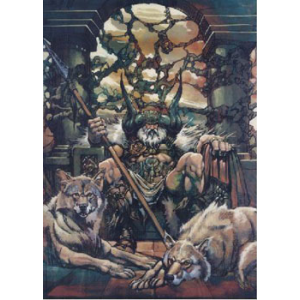
Book: The Walking Dead Draugr And Aptrgangr In Old Norse Literature by Anonymous
For the Vikings, the concept of the afterlife was often much more immediate than glorious skaldic tales of Valholl or the Christian's Heaven: once the dead body was placed within the grave, it was believed to become "animated with a strange life and power" (Hilda Ellis-Davidson. The Road to Hel. Westport CT, Greenwood P., 1943. p. 96). The dead person continued a sort of pseudo-life within the grave, not as a spirit or ghost, but as an actual undead corpse similar in many respects to the "nosferatu" or central European vampire (Ellis-Davidspn, Road to Hel, p. 92).Much like the ancient Greeks, the Vikings had neither a positive or negative view of the afterlife. They believed for the most part, the dead, if they had lived an unexceptional life, would travel to a place called "Hel" (which is where the modern word "hell" comes from) which lies far to the north and under ground. It was a thought of as being a cold and damp place where the spirits of the dead continued in a dreamlike form of existence. It was not particularly happy, but it was not torturous and was viewed as a long sleep. There were other ideas of an afterlife that were believed as well. There was another realm beneath Hel, where people who had lived bad lives were gnawed upon by a serpent called "Nidhoggr". They slept in a hall that was made of snakes and dripped poison. This place, called "Nastrond", was located on the shore of an ice cold subterranean sea. Those who lived exceptional lives in a positive way could expect to travel to "Asgard", the home of the Gods. They would spend the afterlife in happiness. The exact dwelling that was given to these people depended upon their lives. For example: hero's who died in battle would go to "Vahalla" the "Hall of the slain", and live with Odin the king of the Gods. Here they spent all day fighting each other, only to rise from the battlefield in the evening healed of their wounds and then spent the rest of the night feasting. The main theme of the afterlife seems to have been repetition. It was not however, believed to be eternal. They believed that the world of both the living and dead, gods and monsters would one day be destroyed and the universe would begin anew.
Free eBooks (Can Be Downloaded):
Stephen Flowers - The Galdrabok An Icelandic GrimoireStuart Nettleton - The Alchemy Key Unraveling The Single Tangible Secret In All Mysteries
Anonymous - Babylonian And Assyrian Literature
Anonymous - The Walking Dead Draugr And Aptrgangr In Old Norse Literature